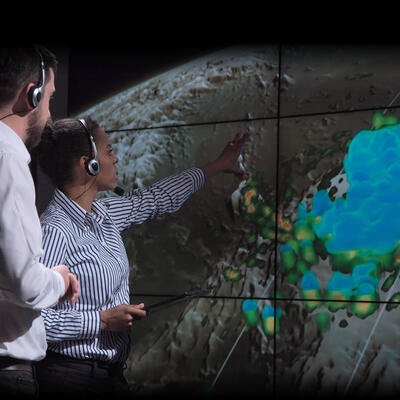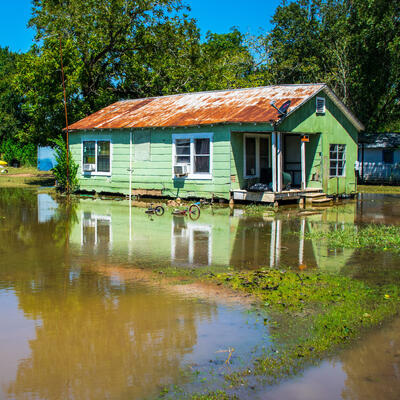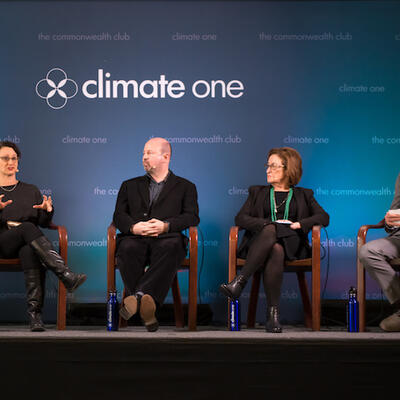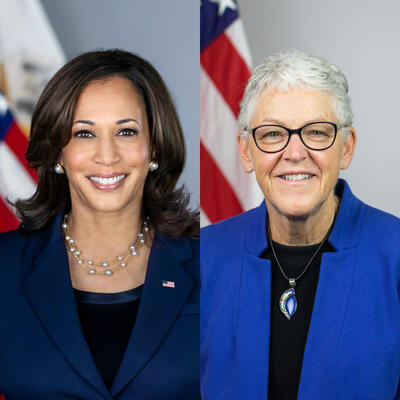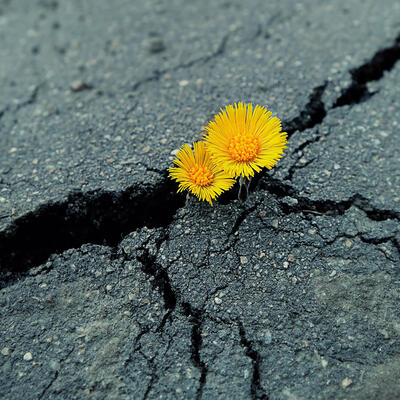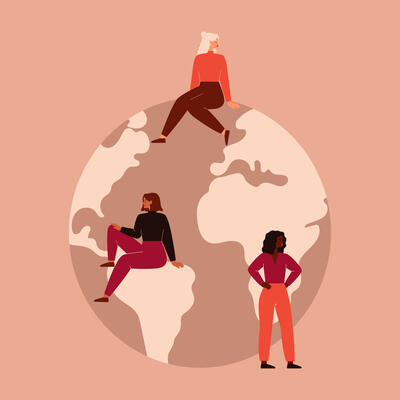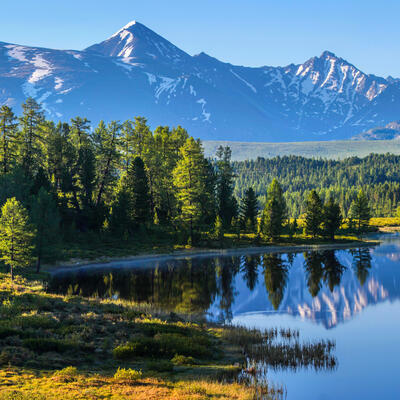
The Future Earth: Eric Holthaus and Katharine Wilkinson
Guests
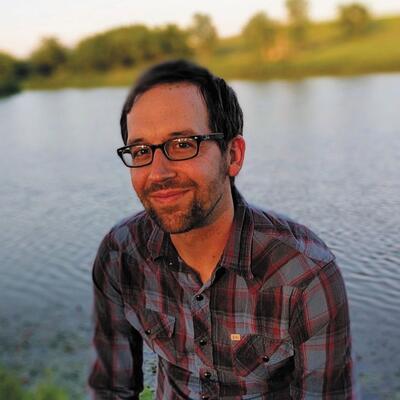
Eric Holthaus
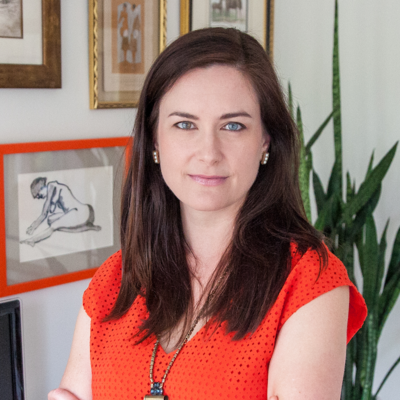
Katharine Wilkinson
Summary
Science has given us a realistic picture of what Earth will look like with unmitigated climate change: increased extreme weather events, crippled economies, and a world where those with the least are the hardest hit. But are those outcomes inevitable? Eric Holthaus doesn’t think so. In his book The Future Earth, Holthaus argues that the solutions are all available to us.
“There is so much that we can still do that actually, it's sort of misleading to think of it as being a lost cause - because it’s not,” he says.
“I mean the most depressing thing is that we waited so long to handle it. But that's in the past, you can't really do much about it at this point other than decide that that's even more motivation to make the change right away.”
The Future Earth imagines a time two to three decades in the future, one in which the Green New Deal has become a reality, fossil fuel burning is criminalized and carbon emissions have been reduced to zero. And it offers a hopeful take on a topic that many find depressing.
Even the most passionate activists can occasionally face dread, hopelessness, crippling climate anxiety. While those feelings can stand in the way of action, Katharine Wilkinson, Vice President of Project Drawdown, reminds us that they’re also part of the journey.
“How do we mourn and imagine, right?” she asks rhetorically. “How do we feel fear and feel determination? Maybe most of all, how do we link arms and keep each other going, because we’re probably not gonna have the fire in the belly ourselves every day.”
By creating community and sharing those feelings, Wilkinson says, “you can rely on each other and feed off each other…having an ecosystem of all these different people and entities and organizations that are involved in this great transformation effort is so critical.”
Additional Speaker: Michael Méndez, assistant professor of environmental planning and policy at the University of California, Irvine
Related Links:
Project Drawdown
The Future Earth: A Radical Vision for What’s Possible in the Age of Warming (Eric Holthaus)
Climate Change from the Streets: How Conflict and Collaboration Strengthen the Environmental Justice Movement (Michael Méndez)
This program was recorded via video on July 21, 2020.
Full Transcript
Greg Dalton: This is Climate One. I’m Greg Dalton. Science tells us that the effects of climate change will be disastrous. But are they inevitable?
Eric Holthaus: There is so much that we can still do that actually, it's sort of misleading to think of it as being a lost cause because it’s not. [:10]
Greg Dalton: What if we could imagine a radically re-envisioned future, one where we replace those doom-and-gloom projections with thriving equitable cities, renewed political consciousness, and carbon-free economies?
Eric Holthaus: With a read of the science that says that with radical action these horrific outcomes are not inevitable, that it's not a depressing story actually at all, it doesn't have to be.
Katharine Wilkinson: And then let’s get into strategy mode and think about how we’re going to take apart what's not working and build something new and beautiful in its place. [:11]
Greg Dalton: The future earth. Up next on Climate One.
---
Greg Dalton: What will the future earth look like?
Climate One conversations feature energy companies and environmentalists, Republicans and Democrats, the exciting and the scary aspects of the climate challenge. I’m Greg Dalton.
On today’s program - reimagining our future. Can the climate crisis be turned around within the next couple of decades?
Eric Holthaus: I mean the most depressing thing is that we waited so long to handle it. But that's in the past, you can't really do much about it at this point other than decide that that's even more motivation to make the change right away. [:12]
Greg Dalton: Eric Holtaus’ new book, The Future Earth: A Radical Vision for What's Possible in the Age of Warming is a hopeful look a topic that is depressing. He imagines a future in which the Green New Deal has become a reality, fossil fuel burning is criminalized and carbon emissions have been reduced to zero. The solutions, he says, are all available to us - if we have the courage to make them happen.
But even the most passionate activists can occasionally face dread, depression, crippling climate anxiety. While those feelings can stand in the way of action, Katharine Wilkinson, Vice President of Project Drawdown, reminds us that they’re also part of the journey.
Katharine Wilkinson: How do we mourn and imagine, right? How do we feel fear and feel determination? Maybe most of all, how do we link arms and keep each other going, because we’re probably not gonna have the fire in the belly ourselves every day. [:15]
Greg Dalton: Experiencing grief over the loss of the environment as we know it is an emotion that’s familiar to many of us. In The Future Earth, Eric Holthaus uses a word that perfectly describes that feeling - “solastalgia.”
PROGRAM PART 1
Eric Holthaus: The original definition was coined by Glenn Albrecht who is an Australian philosopher. And he explored the sort of intersectional far ranging implications of the fossil fuel industry in rural Australia. Talking with communities over long periods of time there. And the one sort of theme that sort of stood out most to him was the sense of loss of their surroundings of what it means to call a place home because the place had so utterly transformed that it was the same place but it wasn't at all the same place. So it's sort of this nostalgia this longing for a place that is no longer the place that you remember or recognize.
And that is sort of I think happening on a global level now when we think about climate. We recognize the seasons we recognize our surroundings but we also feel like something is very wrong. Like in a sort of deep way that many of us really struggle to articulate, I know I do. And then when you read the science on top of that, I mean you don't need to know any science or have any technical training to have this feeling. But then when you add the science on top of it it’s only gonna get worse from here especially if we don't do anything about it. Then it becomes sort of an existential crisis or not really being able to feel at home in your own lived experience. And that is I think what I would say everyone is trying to work through right now regardless of whether or not we’re able to really articulate it.
Greg Dalton: The deep longing for the natural world that we know is never coming back. Eric, I recall vividly your 2018 article that was titled Climate Change Blues and remembering thinking, I’m not the only one who talks about climate depression with a therapist. You wrote that one way to deal with climate depression is admitting our personal limitations. Does that mean that an individual can't save the world
Eric Holthaus: Absolutely. And not only that but it means that we need to start asking a lot of questions about if our mindset is saving the world, then I think that we need to have a lot of sort of thought and conversation about who we’re saving it for and what work we are doing to either advance or detract from that goal. And really I feel like the only answer is that we have to do this work together. Everyone has a role, that we're all sort of equally responsible, not equally responsible, but at least some part responsible and have the ability to make radical changes in our lives. So definitely the responsibility for climate change itself as a phenomenon is very unequal. And I think that sort of understanding where we fit into that and knowing that that doesn't have to define you. You don't have to sort of internalize the guilt and the feeling of inadequacy of moving forward like everyone is possible. We choose every day to continue along our daily routines and those routines can change at any time and it's easier to change those routines if we’re doing it together in a supportive community.
Greg Dalton: Katharine Wilkinson, in your TED talk that has almost 2 million views you said, “To have eyes wide open is to hold a broken heart every day. It's a grief that I rarely speak.” How are you holding that grief now as we see the breakdown of COVID and climate all around us? You said that a broken heart is awake.
Katharine Wilkinson: Yeah. I think about this a lot, right. Not just for climate but for so many of the harms and sort of affronts to life, right that unfold around our world every day. I mean to take all of that and to like really let it into your being. I don't know how to not have a broken heart. And so I think there’s this very subtle but significant difference between just being broken hearted where, you know, I think about myself on like my worst breakup kind of days, right. Like, you know, sort of curled in the fetal position on the couch like not very much use to anyone, including myself. But a broken open heart I think is incredibly powerful. And as Eric is saying I don't think that that's at least for me that's not something that I can sustain alone. It really means coming into community as kind of fellow broken hearts and having that space to grieve, you know. Sometimes it’s interesting what I see in the climate solutions communication space is kind of like railroading over all of the feels, right, that people are understandably bringing to this moment. And I think we need space to feel those things. And I think it's only kind of going through the depth of feeling that we come back into a space of courage. And that’s just a cycle that repeats. So I have a monthly circle that I’m a part of in Atlanta which is not climate focused per se but that’s been a really important kind of consistent drumbeat of a space to show up with whatever it is that I’m carrying at the moment and usually that is grief.
Greg Dalton: Eric Holthaus, you talk about the importance of talking through these things. Climate is a topic that can be a real conversation killer, you know. Sometimes I feel like people look at me and like oh here comes an insurance salesman he’s like always gonna tell us about how bad the climate is or the things we got to change this or change that. How do you handle that in terms of calibrate how you talk about climate? You have a lot of followers, it's part of your identity. Do you think about turning it on or turning it off or up or down because people don't want to hear it overwhelms them?
Eric Holthaus: It's honestly, I think you've hit on the main reason that I wrote this book The Future Earth which is an intentional intervention into that narrative of climate change is a depressing thing to talk about. I just sort of flip that on its head and say that's just sort of like you know, honestly like being completely blunt about it that’s propaganda from the fossil fuel industry to try to convince you not to do anything that's too overwhelming. That this is just the way it’s always gonna be, you know, you might as well get used to it. We might as well focus on adaptation getting used to sea level rise getting used to you know, putting families in the hospital on regular hot days now because we’re not able to like physically withstand our body temperature anymore outdoors. Like that's not a world I want to live in and that's not an inevitable world. Like the science is very clear that none of that is inevitable. Like we are not locked into any of it.
So I think that again with a read of the science that says that with radical action these horrific outcomes are not inevitable, that it's not a depressing story actually at all, it doesn't have to be. But I mean the most depressing thing is that we waited so long to handle it but that's in the past, you can't really do much about it at this point other than decide that that's even more motivation to make the change right away. I mean and we just happen to be in a very transformative moment in history where we’re proving to ourselves every day that so much more is possible than we expected. So yeah I really feel like I would just jump if I was in a conversation with a person that said something if I was try to gently sort of steer it back to saying like there is so much that we can still do that actually, it's sort of misleading to think of it as being a lost cause because it’s not.
Greg Dalton: Katharine Wilkinson, I guess both of you I wanna push back on the idea that oh it's depressing because the fossil fuel companies sold that narrative. There's a lot of science that's come out that has been very scary and dark. And I think that the climate narrative is inherently scary because of the science and the science is even watered down and is somewhat less dramatic than the -- the peer-reviewed science is often more conservative than the actual reality. But Katharine Wilkinson, is a climate narrative inherently scary or that fossil fuel company trope that they're trying to sell us
Katharine Wilkinson: I think that if you’re not scared you’re probably not awake, right, in some significant way. But I think the question is what do we do, right, are the feelings of fear or grief are those the ending feelings, right. Or do we actually find our way maybe not through those but sort of moving forward with those feelings in tow. And so I think it’s that question of engagement and of moving forward that Eric's referring to that there are a lot of interest, right, in seeing us wallow. That would be great if all of these climate caring humans just sort of wallowed in grief and stayed paralyzed by fear that would be a helpful thing for us to do from some perspectives.
And so I think the point that Eric makes in this book is so critical that there is still an opening. And so how do we mourn and imagine, right. How do we feel fear and feel determination. Maybe most of all, how do we link arms and keep each other going because we’re probably not gonna have the fire in the belly ourselves every day. But in community you can rely on each other and feed off each other. And I think that notion of having an ecosystem of all these different people and entities and organizations that are involved in this great transformation effort is so critical. Because I don't know anyone who can show up in full cape hero mode every day, right. And some days, you know, the best thing I think that I at least I find that I can do is actually maybe it's hold the space for the hard feelings and then we get back into motion together. And that there’s a dialectic I think between sort of the emotional experience that we’re all in and we’re so much more connected to the living systems of this planet than we've been taught to think that we are, right. I do think that we can feel what’s happening in the systems of life. And then let’s get into strategy mode and think about how we’re going to take apart what's not working and build something new and beautiful in its place.
Greg Dalton: You talk about being more courageous and more emotionally intelligent. And Eric you write about the difference between courage and hope and you quote Kate Marvel who's a scientist saying, “Courage is the resolve to do well without the assurance of a happy ending.” And so much of the conversation around climate is I want to know if my actions are gonna have an impact. I want to know if there's hope, because if there isn’t hope why should I inconvenience myself. Why should I change? Why should I incur some cost? So talk about the difference between courage and hope.
Eric Holthaus: Yeah, I think hope is what happens when you deny that there is fear. Like the previous question that you had is that if you are working on climate expecting everything to be okay because of your actions and you don't feel that fire that Katharine was talking about both in terms of anger and energy and fear and all those red emotions that are sort of propelling you throughout the day that you need to recover from and recharge from. If you're not feeling that then I think that you probably don't have a full or maybe you've blocked part of that in your head somehow.
And I think that's where we get into the hope narratives of saying you know if you just pour a bunch of you know venture capital into this, you know, maglev train startup, you know, then we’re gonna fix the world with like you know, making planes obsolete or something like that. Like it’s not there’s no silver bullet here and you're not gonna have a magical solution to this problem. The problem itself is like how we’ve structured society. So I think courage is understanding that it's hard work that we’re doing and that we’re up against the odds and actually the odds are not good that we will do what we need to do. But we have to do it anyway. And for a lot of us we have no choice but to do this work. People that are already on the front lines of change, people that have already lost loved ones in climate disasters, people who have been marginalized for hundreds of years by the systems that are sort of perpetuating the climate emergency. Those people have no choice but to do this work. And you’re sort of working as a survival mechanism to do the work when you see the climate problem that way I think.
---
Greg Dalton: You’re listening to a Climate One conversation about creating a future free of fossil fuels. Coming up, the role of social justice in battling climate change.
Eric Holthaus: If we don't have people who are healthy and able to engage and to live their lives then we're not gonna be able to have a climate movement or a society at all.
Greg Dalton: That’s up next, when Climate One continues.
---
Greg Dalton: This is Climate One. I’m Greg Dalton, and we’re talking about the future earth, with climate journalist Eric Holthaus and Katharine Wilkinson of Project Drawdown.
The existential threat that climate change presents can be overwhelming for us non-scientists. As in most things, we want our climate experts to be informed, rational and clear-headed. But both of my guests have been very open about the scary, complicated and sometimes paralyzing feelings that climate change brings up for them. Is there a place for emotional vulnerability in the climate conversation?
PROGRAM PART 2
Katharine Wilkinson: This is an interesting question I think, Greg. And it's taking me back actually to the creation of that TED talk and there was a bit of a rub about you need to strip the emotion out of this. Maybe you can have some at the end and I was just like, no. A, because I don’t actually know how to come to this conversation authentically without that layer. And also, I think that we know that it hasn’t worked, right. So we know that this sort of dry, wonky, you’ve got to be an expert to even begin understanding what’s going on. Like that just has not worked to engage people to move people. And when we’re talking about place, when we’re talking about community when we’re talking about values, right. This is all heart content basically. And so, you know, perhaps I just feel grateful that I haven't known really any other way to be in the world except kind of a hopeless interdisciplinarian across academic disciplines from religion to policy and sort of everything in between. And more than anything I think what’s effective in terms of communication really about anything is whether you show up as an integrated human. Meaning that what you're holding on the inside is coming through on the outside. And what’s showing up on the outside is connected to what’s on the inside. Like we’re always looking for that integrity I think. And when we shut down parts of ourselves I think we lose that sense of wholeness and it’s hard to trust people and messengers who don't seem to be showing up in kind of a human wholeness.
Greg Dalton: And Eric the same for you. Meteorology, I’ve heard climate scientists say, well just because you experience the weather that's not science just because it’s changing over your head. We need to stick to facts and peer-reviewed research. Your thoughts on the dissection the separating the emotional and the scientific when it comes to the climate conversation?
Eric Holthaus: Yeah. Well, first off I don’t have a PhD. But actually that's probably a good way to talk about this. I started two different PhD programs and dropped out of both of them because I felt like I couldn't focus on a single question for four years. Because it’s just not how my brain works. I was like maybe I'm not as smart as I thought I was, like internalizing all of that academia, like PhD is the only way to do your work PhD is the only way to succeed. And I just like you know over the past 15 or 20 years of like from the moment that I first like really learned about climate and the extent of what climate change meant not only to meteorology but to me as a human. I feel like it just became something that was difficult for me to pull out of who I was. Like it sort of just became something I was striving to understand in all parts of my life. And talking about it through math equations didn't seem like a good way at all to do it. I think it also, you know, historically, the climate movement has bought in to that information deficit Western top-down model of knowledge. That's just not how most of the people in the world think about knowledge.
And I think, you know, like maybe it would help climate scientists to be in counseling to work through some of that. I mean I feel like everyone, especially men, should be in counseling something that is just like not really thought of as being okay. And it's actually something if you're doing climate work it’s something that is really necessary for you to sort of figure out how it's affecting you and how you're able to keep going because it’s really hard to keep going every day and you really need to have help in doing. This is a very, very, very weird thing that we’re doing like this is a weird moment in Earth history and in human history. And we, you know, those of us who happen to be between the ages of 20 and 90 right now that are like in our moment of this is just such a slim sliver of humanity that's been tasked with this 30-year transition period. If we’re at or approaching net zero carbon in 2050 we will have done it, but we those of us on this call those of us listening to this anyone that you know that’s alive right now will be the ones doing that work. There's just not gonna be another generation that's gonna have time to get old enough to do that work. So it’s us. So like you can't really skip it anymore like it's going to be you whether you like it or not.
Greg Dalton: Yeah, therapy helped me a lot and I don’t see how you can be alive these days and work with some of those things. If you’re just joining us we’re talking with Eric Holthaus weather journalist and author of The Future Earth: A Radical Vision for What's Possible in the Age of Warming. And Katharine Wilkinson, Vice President of Project Drawdown an author and strategist and teacher.
Michael Mendez grew up in the Northeast San Fernando Valley surrounded by polluting factories, freeways, and a lack of green space. Now an assistant professor at the University of California, Irvine, Mendez spent years interviewing residents and activists in similar cities like Oakland and Richmond, California. His new book, Climate Change from the Streets: How Conflict and Collaboration Strengthen the Environmental Justice Movement. Documents how low income people of color in these environmentally unhealthy areas have built a movement and influenced the high-level conversations taking place. Although his book was published a few months before COVID hit the U.S,. in a recent conversation with Climate One’s Andrew Stelzer, Mendez said the ripple effects of those activists’ work can be seen in the streets and the halls of power right now
[Start Playback]
Michael Mendez: I live in downtown Long Beach which historically been a very diverse low-income area with lots of environmental burden. So we had the second largest port in the United States. We’re also a major oil producer and most recently activists have pushed the Mayor Robert Garcia and the City Council to rethink it's reliance on fossil fuel. And they're putting on the ballot for November a new initiative that puts additional excise tax on oil production on barrels and put that towards climate justice and investing in new climate initiatives throughout the low-income communities of color here in Long Beach. So that’s just one small example that happened post BLM protest. Pre-March 2020 many of these initiatives were considered radical now they’re trying to become part of the norm and part of the discussion initiatives that were impossible or too progressive are starting to be seen as achievable and scalable. And new initiatives that go even farther are being introduced and discussed and not tabled or dead on arrival.
Male Speaker: Mendez says the grassroots organizing being done for years laid the groundwork for how we study COVID and interpret that data.
Michael Mendez: These individuals that live next to these polluting industries have been shown through a recent study from Harvard that they’re more vulnerable to COVID-19 because they have asthma or other type of respiratory diseases. So I think what is really showing the linkage between environmental injustice and existing health disparities and emerging health disparities that are happening through this pandemic. So the unique intersections and connections are really been uplifted and I think people are been motivated by that to have more cross disciplinary or cross coalition building projects. I think what people are seeing is the ability to reimagine re-envision our society that's more equitable and more just and centering people of color, Blacks, Latinos and other Brown low-income people at the center of these decisions because they’re at the front lines and the most vulnerable of these impacts.
Male Speaker: Mendez says despite the immense amount of suffering and upheaval taking place. He's optimistic.
Michael Mendez: I think most activists and academics like myself are optimistic because we’re here to enact social change. And while you have to be explicit about the disparities and be very stern about disparities and that they’re real but you also have to provide alternatives of what is possible. So there is inherent within that optimism and hope and my book Climate Change from the Streets the subtitle is How Conflict and Collaboration Strengthen the Environmental Justice Movement really is a hopeful message of and these Environmental Justice activists have really fought to shed light on some of these inequities these environmental burdens that are happening in the communities. And provide hope for re-envisioning our communities and our society.
[End Playback]
Greg Dalton: That was Michael Mendez, assistant professor at the University of California, Irvine and author of Climate Change from the Streets. Eric Holthaus, you talk about this moment of tremendous uncertainty and tremendous opportunity. He says in there that the measures thought to be impossible or too progressive are now seen as achievable and scalable. So speak to that moment of opportunity and ambition that he just mentioned.
Eric Holthaus: Yeah. Well, I think that we have to first say that this environmental justice movement is not new. What he's describing has been going on for decades and decades and centuries, even. Environment centered indigenous uprising has been taking place in this continent for over 500 years. So I think that focusing on telling different stories about the future or what is possible is sort of yeah like he said the key to making change is not just tearing down a destructive extractive racist capitalist system that has harmed disproportionately people of color. But it is at the same time building up a vision of some world that is the kind of world where we couldn't even imagine something like climate change taking place because we are in right relationship with each other and the planet and all living things. Really more of an ecologically focused society at its core, which requires sort of rethinking back down to the fundamental questions of why are we in a society. Why do we work together at all? Why do we have a government? What is the role of having civic engagement at all? And those are kind of the questions. This is why you see environmental justice movements asking for demanding changes that on first look, don't really look like climate policies like universal housing or universal healthcare. You have to take care of your body before you’re able to take care of society and of the environment. So if we don't have people who are healthy and able to engage and to live their lives then we're not gonna be able to have a climate movement or a society at all. So that’s why I think this is a transformative moment. And that search for justice is more important than climate. Climate change is kind of a subset of this broader problem of injustice in the world. So that's why you see all of these movements linking together now.
Greg Dalton: We’re talking about climate change and the ambition and possibility with Katharine Wilkinson and Eric Holthaus.
Eric, you write in The Future Earth it’s 2021, Congress has banned all fossil fuel industry advertisements, expanded the Supreme Court and instituted term limits on it, and abolished the filibuster in the Senate. There are six new states: Washington DC, Puerto Rico, Virgin Islands, Guam, Northern Mariana Islands and American Samoa. The new U.S. flag has 56 stars. So I was reading that and it made me all like oh no that can't happen that's too ambitious. That made me uneasy. But I was almost afraid to be that excited or to allow that possibility. So talk to me about how you’re trying to create this vision without getting caught up in the, oh that can’t happen.
Eric Holthaus: Yeah, I mean also keep in mind that I wrote this or finished this in early January of 2020 and COVID was just becoming a news story in China. And I thought you know this like fantastical scenario that I had of converging, you know, and the way I have it written in the book is converging hurricane disasters in Miami and DC and Southern China and a few other places combined with you know, and El Niño and global food shortage. And you know, kind of repeating 2015, 2016, but compressed into a span of three months and then all for whatever reason, you know, the school strike movement all of that and there's just a switch that flipped in people's minds that it's just now it's happening now. Like it’s not gonna happen in three years it’s gonna happen now. Which is kind of the feeling that I've had this year, you know, for very different reasons than what I had clearly completely made up in my book.
But, you know, I feel like that's not that farfetched anymore even though it really was six months ago. Like I doubt that some of the Pacific territories will become a state next year but that, you know, we are starting to talk about decolonization. So it won't it absolutely won't happen the way I have it written in this book. Probably nothing that I have written in this book will absolutely happen. But it's sort of supposed to be a picture of the kinds of things that are possible. Not likely, but possible.
Greg Dalton: And Katharine, some of the way that that's possible is including more voices and minds and people in the decision making that’s happened so far. Talk to us about how so much, you know, the domination of white men has shaped and constrained our approach to solutions the way, certainly our approach to climate the very technocratic approach that frankly manifest in Project Drawdown a lot of technocratic solutions about how that's limited us and how that needs to be opened up.
Katharine Wilkinson: Yeah. This question, Greg, is taking me back to what we might call a rage hike that Doctor Ayana Elizabeth Johnson and I were on little over a year ago in Aspen and sort of having one of these moments of like how are there so many brilliant women in this space who have so much to say and such bold ideas and visions and yet there’s this like relatively small cabal of white men who have dominated so much of climate discourse. And their voices are super valuable but they are not the only voices that are valuable, especially when we think about the depth of transformation that needs to happen, right. Those who have been kind of most supported by the status quo are probably not going to have the boldest ideas for how to change it. When we think about, you know, the polling of who cares, right, who is more concerned who is more engaged? We see people of color and we see women. There’s a consistent gender gap and a consistent race gap in polling around climate concern and action. And then also, you know, we’re talking about to change everything it takes everyone to also quote Ayana. That’s the situation we’re in and we need the biggest and strongest team possible and the solutions that are, you know, maybe the favorites of Silicon Valley and engineering schools, those have a place at the table. But they’re not the only ones and even when we think about Project Drawdowns work there are solutions that we haven’t been able to include because there's a commitment to quantification in Project Drawdown’s work. That depends on existing data and research, right. None of it is our data none of it is our research.
So it’s really a synthesis effort of existing work. And if that work hasn't been done you know by a think tank or in academia etc. it’s not there to be included. And so we see the way that the ripple effects, of not having genuinely diverse and inclusive and equitable leadership plays out. And that the outcome of this rage hike are small contributions to trying to shift this as Ayana and I curated and co-edited a collection of just incredible wisdom by 41 women leading on climate in various ways in the U.S. But we are also really intentional about including art and poetry because we don't know how to have this conversation in only a sort of logic essay kind of mindset, right. We also need the Alice Walkers and Mary Olivers of the world to help us feel our feelings and know that we’re not alone.
So, yeah, this is, I really believe that the climate crisis is a leadership crisis. And a huge part of the leadership crisis is simply who gets the platforms and the resources and the power to lead. And it’s one of the most exciting things about the youth climate movement is simply, you know, what’s happening and just stepping in and taking those things, frankly. And I wished we’d have that much gumption when I was kind of more engaged in youth climate activism some 15 years ago.
---
Greg Dalton: You're listening to a conversation about the future of the climate movement. Coming up, more on the leadership crisis. Is it time for a power shift?
Katharine Wilkinson: We know we have to change the rules. We know culture has to shift. We know we have to build power, right...because if those with an interest in transformation held power, then we would see transformation come to pass. [:12]
Greg Dalton: That’s up next, when Climate One continues.
---
Greg Dalton: This is Climate One. I’m Greg Dalton. We’re talking about visionary pathways to a carbon-free future. My guests are Katharine Wilkinson, vice president of Project Drawdown, and climate journalist Eric Holthaus.
Progress toward that carbon-free future may hang in the balance with the presidential election. In a recent speech, Vice President Mike Pence warned that a President Joe Biden would destroy the fossil fuel industry. Eric Holthaus thinks that would be for the best.
PROGRAM PART 3
Eric Holthaus: I think that the fossil fuel industry can't and shouldn't exist in its current form. If we’re going to continue to make sort of the necessary changes to have a sort of survivable century. I mean one idea is that like the fossil fuel industry could be nationalized as it has been in other countries. And then the people who already provide a lot of, you know, billions of dollars of subsidies to the industry would have a more direct say in the future of the industry. I don't think people are necessarily opposed to companies making money for providing services but I think if those services sort of like intentionally destroy the planet that it shouldn't be a business that’s allowed to continue in that current way.
So I think that there are other ways of providing all the services that fossil fuel industry provides which is, you know, in the end of the day, you know, transportation, heating, plastics, chemicals, that kind of thing are what the fossil fuel industry provides. There are other ways to get to those outcomes besides using fossil fuels. We have the available technology to do that. So, I don't think -- yeah, again that’s a long answer for just saying. What my tweet said was good that Joe Biden is going to destroy the fossil fuel industry and I just said good. So if that’s much more succinct way of my long answer.
Greg Dalton: So yes you’d like to see them go out of business rather than sort of be part of the solution using their scale, their capital, their muscle.
Katharine do you think that fossil fuel companies are good faith actors? And I should note that you spent some years as a consultant for the Boston Consulting Group. Katharine do you think that fossil fuel companies are good-faith actors in participating in the transition to a cleaner economy?
Katharine Wilkinson: I mean I think this is kind of one of those things where you look at the last three, four decades and we’ve got pretty good evidence to suggest that they have not been good faith actors, right? It’s not like there hasn’t been a shortage of power it’s not like there hasn’t been a shortage of capital. And there certainly was not a shortage of knowledge and understanding of what was going on with burning fossil fuels. So I think, you know, when you have every advantage working for you to be part of the solution if you so choose. Is there a likelihood that these companies are not going to try to extract and burn every bit of material that is the very thing that makes those companies valuable. I mean it just sort of those against basic logic and it certainly goes against capitalism. So I think our efforts are much better spent instead of trying to turn battleships that have been sailing in the wrong direction for decades to actually get on board with the zippy sailboats that are already heading the right way. I think it's really, really hard to change behemoths. That was certainly my experience in consulting even when you have leaders who really want to do that. So I’m skeptical.
Greg Dalton: Eric Holthaus, your twitter feeds described you as an eco-socialist. What is that
Eric Holthaus: That’s a good question. I think that it's something that is I mean, at its core, when I think of eco-socialism is a world that works together with nature rather than sort of treats nature as a resource. And I would include people as a part of nature in that definition, you know, people are animals just like every other animal and we are all dependent on each other. We are indistinguishable from the world and the planet and the environment around us. We are part of a living ecosystem. And I don't think that there can be any real long-term success justice, stability, whatever you want to call it without recognizing that. That is the core truth of who we are and why we’re here. And I think having an economy and having a society that reflects that is a first step towards creating a better world that works for everyone.
I don't necessarily think -- and you know even in my book I am talking about again with the interview with Kate Raworth talking about capitalism versus socialism. And I think that's the wrong question. I think that the answer is something there's a word that we probably haven't even invented yet that describes where we’re headed. I don't think that getting into sort of a buzzword war is going to help anyone. I think that what we really need to do is just sort of rethink everything and see what happens. And be honest about having that conversation, be honest about upholding communities and people who have been marginalized by the past few hundred years. And then just see what happens because none of us know what’s gonna happen after we do that work because we haven't done that work yet.
Greg Dalton: And Project Drawdown did a list of the top 10 many solutions food waste, empowering women, educating girls with things that exist today and are economic. So if they all exist, Katharine, why aren't they -- if we have the solutions why aren’t they being implemented and tell us about that mentality of the engineers and brains that created those.
Katharine Wilkinson: This is something that in the Drawdown Review that kind of update to our work that we released in March we tried to at least bring some nod into at the end which is this, you know, there’s a real difference between what some of the solutions are and how we move them forward and who's involved to decide who benefits and all the rest. And I think Eric puts this really well in The Future Earth that we need this wildly gung ho uprising of demand for change and transformation. But I think there are a number of different kind of leverage points for lack of a better term that are critical for moving solutions forward at speed and at scale. And some of those are things that I think are more comfortable for folks, right, moving capital or shifting behavior.
But we know we have to change the rules we know culture has to shift. We know we have to build power, right. At the end of the day, perhaps of all of the accelerators that is the most critical one. Because if those with an interest in transformation held power then we would see transformation come to pass. And we still have far too many who are either sort of letting the status quo hang or actively trying to entrench it who are running the show. So, yeah, if I were to boil it down I think I would fall very much in the camp of what Eric pens in the book. That we need an incredibly beautiful and connected social movement like we’ve never seen but maybe we’re beginning to.
Greg Dalton: I vividly remember interviewing Bill McKibben one point and him leaning into me and saying we won the argument on the facts decades ago. This is about power. Katharine Wilkinson, Bill McKibben, probably the most notable climate advocate in the country recently stepped back from the organization that he founded. So tell us about that and what white men should do with the power they have.
Katharine Wilkinson: I really appreciated the letter that Bill wrote kind of around that moment of transition. And specifically addressing that, you know, even though internally he had already pulled back, right, sort of the leadership of the organization the torch had already really passed. But the public perception was still 350 equals Bill which make sense as the founder. But the downside of that is that particularly incredible women who are in leadership roles within 350 were getting sort of overlooked or sidelined or kind of not getting the mic as much as their roles would merit. And so, you know, I think it was really important for Bill to sort of more definitively say, you know, hey, I’m moving to a support role here and pay attention to who now the leaders of this organization are. I thought it was really thoughtful and as much as we would like to sort of say like oh well, I’ll, you know, and I think about this also as a white woman, right. It would be nice to be able to think well, I’ll keep the microphone and also we’ll just create more microphones. But we know that sort of not how it works. So sometimes the thing is actually giving up your seat at the table, right, or your slot on the panel or the keynote or whatever that is. And I think certainly for me I’m sort of modeling my way through all of that. But I thought Bill, yeah, Bill did a nice sort of role modeling whether he intended to or not I think that’s the kind of thing we need to see in the climate space and elsewhere.
Greg Dalton: #ShareTheMicNow you can look on Twitter for that. We started on the personal level and I wanna end on a personal level. There’s often a feeling in climate conversations who have shame like we’re bad, everything we do. I don't know about you but I'm feeling awful about take-out food these days and all the plastic forks and bags that I'm given and what do I do with them. So I wanna ask, first Eric about how much you obsess over all those little things that can tie a person's brain in knots about the eco-and personal health impacts of daily action. Is that important for virtue and internal alignment or is it a distraction and something that takes us our eyes off the big picture that we really the visionary future that you write about?
Eric Holthaus: Yeah, honestly I feel like you need both. I feel like you need individual action and you need to be working toward systemic change at the same time that one cannot happen without the other one. You have to feel personally invested and involved. I know when I tried to sharply scale back how much I find and was public about it and wrote a couple essays about it. That was an opportunity for me to talk about sort of the systemic change that needs to happen in transportation worldwide and the inequality inherent in air travel as it is right now. Those systemic changes is what I'm wanting it doesn't really matter to the climate too much if I fly or not, but it does matter if all of us fly or not. So and all those actions are just individual people choosing their whether they're gonna fly or not. So yes your individual change matters a huge amount and also the systemic change matters a huge amount and you can’t get one without the other.
Greg Dalton: Yeah, we’re seeing that a lot with wearing masks and COVID that individual and collective. Katharine your thoughts on, first of all Drawdown is a lot about LED lights and heat pumps and sort of tactical things that people can do. Most people can't live in kind of the visionary future that Eric writes about and you talk about. So how do you handle sort of toggling between that ambitious vision and your daily life and how obsessed do you get over those decisions?
Katharine Wilkinson: So I think this is one of those questions that comes up and I feel like I’m best positioned to speak to it from my own personal experience. Which was kind of in the same moment when I was a sophomore in high school I spent a semester at this wonderful spot called the Outdoor Academy in Western North Carolina in the Appalachians. And it was when I sort of got politicized and kind of became an activist in my 16-year-old way certainly not as savvy as those today. But that was also the time that I became vegetarian. So there was kind of always this hand in hand sort of sense of like making changes in day-to-day life and participating in collective action. And that some of those day-to-day or meal to meal kinds of choices as the case may be were just a way to feel connected to my values into the future that I hope we’re creating even though, you know, as Eric said about flying kind of, you know, adding up that impact over the last two decades of not eating meat is minuscule for the atmosphere. But it makes me feel like I'm somehow walking down the path that I hope we’re all headed on. And I think that’s where, you know, choosing to take actions that feel somehow we have some excitement about, right, or like they feel it doesn’t feel like some kind of puritanical checklist, right. But it actually feels like oh, you know, in those small ways I’m kind of walking the future and into reality. And certainly we know that those individual actions will never be enough but I think it can be sort of a nicely generative piece of the puzzle.
---
Greg Dalton: You’ve been listening to Climate One. We’ve been talking about the future earth, with Katharine Wilkonson, president of Project Drawdown, and Eric Holthaus, author of The Future Earth: A Radical Vision for What's Possible in the Age of Warming.
Greg Dalton: To hear more Climate One conversations, subscribe to our podcast on Apple Podcasts, Spotify or wherever you get your pods. Please help us get people talking more about climate by giving us a rating or review. It really does help advance the climate conversation.
Greg Dalton: Kelli Pennington directs our audience engagement. Tyler Reed is our producer. Sara-Katherine Coxon is the strategy and content manager. Steve Fox is director of advancement. Anny Celsi edited the program. Our audio team is Mark Kirchner, Arnav Gupta, and Andrew Stelzer. Dr. Gloria Duffy is CEO of The Commonwealth Club of California, where our program originates. [pause] I’m Greg Dalton.

